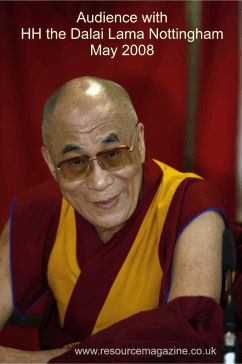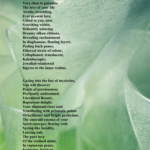Christine Miller
Those of you who know about my long-term research project into Love – Love in the Boardroom and Love in Organisations via www.Loveworks.co – will understand exactly why I was attracted to the ‘Empathy and Compassion in Society’ conference which took place in London’s South Bank on October 24th as the subject matter fits perfectly with many aspects of my work in the field of human potential for ReSource magazine.
 This piece is a quick snapshot of the event; every part of the day was valuable, and all will be included in fuller pieces to follow. There was a stellar line up of 20 speakers including guest of honour, Karen Armstrong (Charter for Compassion), Daniel Goleman (of Emotional Intelligence fame), Adam Grant (leading US business school Wharton’s youngest tenured professor and highest rated teacher) and Jo Berry, Founder of Building Bridges for Peace.
This piece is a quick snapshot of the event; every part of the day was valuable, and all will be included in fuller pieces to follow. There was a stellar line up of 20 speakers including guest of honour, Karen Armstrong (Charter for Compassion), Daniel Goleman (of Emotional Intelligence fame), Adam Grant (leading US business school Wharton’s youngest tenured professor and highest rated teacher) and Jo Berry, Founder of Building Bridges for Peace.
The conference offered a rich and varied feast of ideas and practical suggestions for increasing compassion in society, from schools to workplaces, in healthcare and homes, from the individual to the collective, with great sign posts to research from Stanford’s Emma Seppala and enthusiasm shining throughout.
 The day began with a message, courtesy of David Rand, Executive Director of The Tenzin Gyatso Institute, from HH the Dalai Lama, who said there should be many more conferences dedicated to compassion, as loving kindness is such an important quality and way of being. This was followed by a moving talk from Karen Armstrong about the great need for compassion in our world. Karen is currently working with TED on a major international project to propagate the Charter for Compassion, which was crafted by leading thinkers in six of the world’s religions.
The day began with a message, courtesy of David Rand, Executive Director of The Tenzin Gyatso Institute, from HH the Dalai Lama, who said there should be many more conferences dedicated to compassion, as loving kindness is such an important quality and way of being. This was followed by a moving talk from Karen Armstrong about the great need for compassion in our world. Karen is currently working with TED on a major international project to propagate the Charter for Compassion, which was crafted by leading thinkers in six of the world’s religions.
 Engagingly com-passionate Associate Professor of the University of Texas, Kristin Neff treated us to a range of techniques for being compassionate to ourselves as well as to others, so that we gave ourselves permission for self-compassion, Kristin’s area of interest and outstanding expertise. Kristin is author of the internationally acclaimed book Self-Compassion (2011) and is also featured in the bestselling book and award-winning documentary The Horse Boy, which chronicles her family’s journey to Mongolia where they trekked on horseback to find healing for her autistic son.
Engagingly com-passionate Associate Professor of the University of Texas, Kristin Neff treated us to a range of techniques for being compassionate to ourselves as well as to others, so that we gave ourselves permission for self-compassion, Kristin’s area of interest and outstanding expertise. Kristin is author of the internationally acclaimed book Self-Compassion (2011) and is also featured in the bestselling book and award-winning documentary The Horse Boy, which chronicles her family’s journey to Mongolia where they trekked on horseback to find healing for her autistic son.
 A round table discussion gave us great insights from some active advocates and practitioners of compassion including Richard Barrett, an author, speaker and social commentator on the evolution of human values in business and society. He is the Founder and Chairman of the Barrett Values Centre, a values-based leadership programme used in 60 countries to support more than 4,000 organisations. His recent publications include The Values-Driven Organisation: Unleashing Human Potential for Performance and Profit(2013) and Love, Fear and the Destiny of Nations (2011).
A round table discussion gave us great insights from some active advocates and practitioners of compassion including Richard Barrett, an author, speaker and social commentator on the evolution of human values in business and society. He is the Founder and Chairman of the Barrett Values Centre, a values-based leadership programme used in 60 countries to support more than 4,000 organisations. His recent publications include The Values-Driven Organisation: Unleashing Human Potential for Performance and Profit(2013) and Love, Fear and the Destiny of Nations (2011).
 Another panelist was Maureen Cooper, the author of ‘The Compassionate Mind Approach to Reducing Stress’, which is due to be published in the UK in September 2013.
Another panelist was Maureen Cooper, the author of ‘The Compassionate Mind Approach to Reducing Stress’, which is due to be published in the UK in September 2013.
Maureen is also founder of Awareness in Action, a consultancy dedicated to the secular application of mindfulness, meditation and compassion in the workplace.
 Also on the panel was inspirational and entertaining Kevin Jones, headmaster of St John’s College School in Cambridge, who was awarded the 2013 Tatler Prize for Best Headmaster. One of the school’s many strengths is its mindfulness programme, part of the school’s emotions for learning project designed to strengthen children’s emotional resilience.
Also on the panel was inspirational and entertaining Kevin Jones, headmaster of St John’s College School in Cambridge, who was awarded the 2013 Tatler Prize for Best Headmaster. One of the school’s many strengths is its mindfulness programme, part of the school’s emotions for learning project designed to strengthen children’s emotional resilience.
Paul Ekman, who is a leading clinical psychologist and pioneer in the study of emotions, came to us by video message and discussed whether compassion is an emotion and whether it can be cultivated. His 1970s research shows that emotions are universal and the facial expressions associated with some emotions are common to all humans.

 The afternoon brought us a selection of valuable workshops, followed by examples of ways in which compassion is being encouraged in a number of organisations from Tesco, through The Reader Organisation and Jane Davis MBE to hospitals in Australia, via Liz Lobb and Alexandra Yuille, insight into the concept of ‘Give and Take’ from Adam Grant, and Daniel Goleman’s wonderful speech about leadership and compassion, about which more to follow.
The afternoon brought us a selection of valuable workshops, followed by examples of ways in which compassion is being encouraged in a number of organisations from Tesco, through The Reader Organisation and Jane Davis MBE to hospitals in Australia, via Liz Lobb and Alexandra Yuille, insight into the concept of ‘Give and Take’ from Adam Grant, and Daniel Goleman’s wonderful speech about leadership and compassion, about which more to follow.
This conference offered such a packed and powerful schedule, it will take me a while to process the individual elements and report further, but in the meantime if you have some time this weekend, do register and go along to the workshops, you will be doing a great kindness to yourself by learning more. Do visit the link below and find out more.
Empathy and Compassion in Society
Thanks to Sophie & Olivia at TPR-Media for your cooperation – much appreciated.







